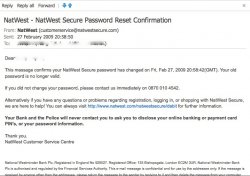I received an email from supposedly my bank about a password change, and it had my actual name on it plus the time it said I had changed it.
The thing is, I had not changed it and so I went to a seperate link to the natwest site, and lo and behold my current password worked. I then phoned the bank up, and they said it was a phishing scam, but I just wanted to warn you and anyone you know about this. Because it had my real name on it, it scared me a little and I could not spot any spelling errors in the email either. I have registered another email account but not th one shown in the picture.
I usually spot these a mile away, so just be careful.
The thing is, I had not changed it and so I went to a seperate link to the natwest site, and lo and behold my current password worked. I then phoned the bank up, and they said it was a phishing scam, but I just wanted to warn you and anyone you know about this. Because it had my real name on it, it scared me a little and I could not spot any spelling errors in the email either. I have registered another email account but not th one shown in the picture.
I usually spot these a mile away, so just be careful.



